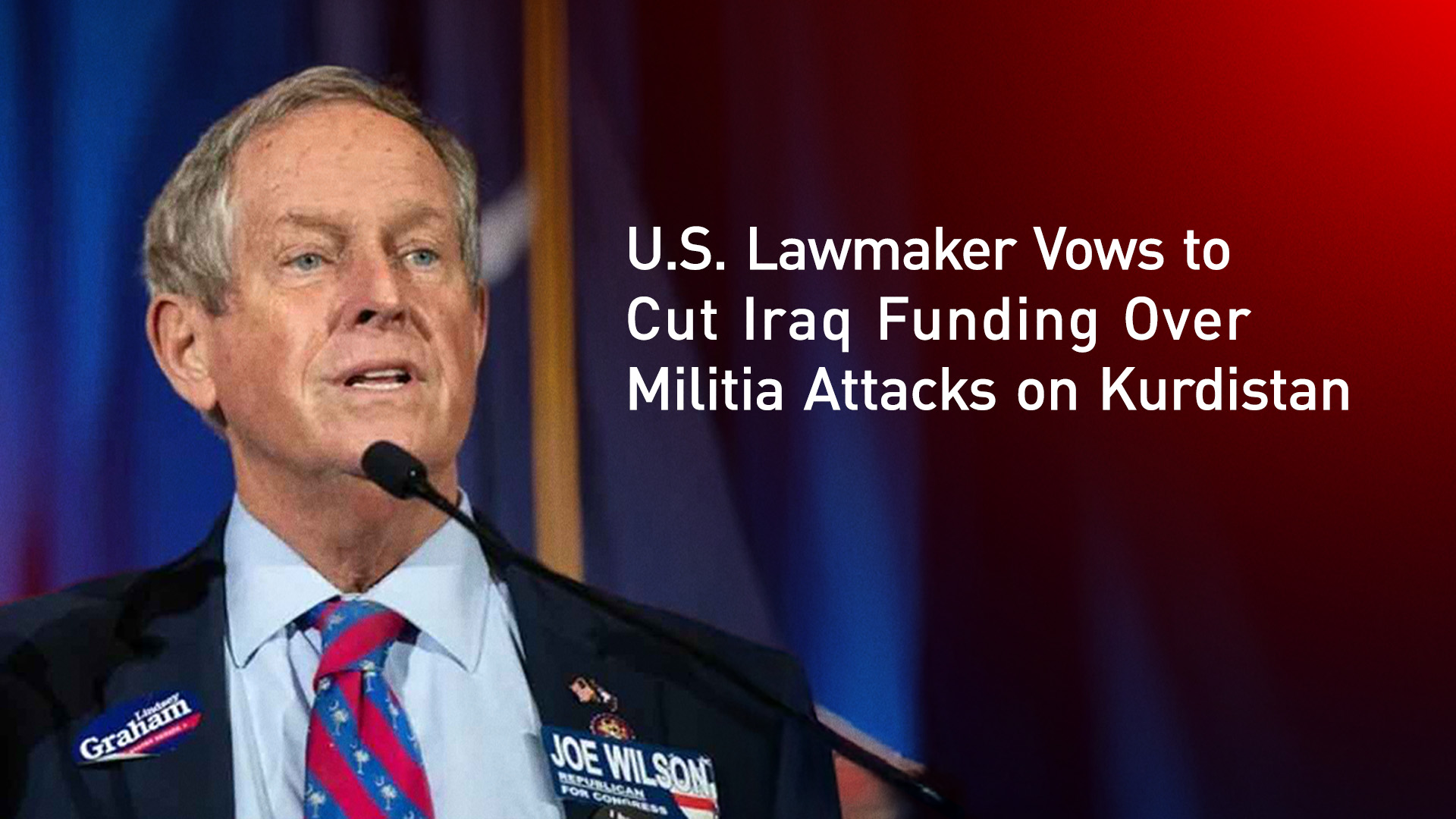U.S. Lawmaker Vows to Cut Iraq Funding Over Militia Attacks on Kurdistan
U.S. Rep. Joe Wilson vowed to block funding to Iraq, accusing Baghdad of backing Iranian militias attacking Kurdistan. He urged designating them as terrorists. The move follows a wave of drone attacks, rising U.S. frustration, and calls for Baghdad to act.

ERBIL (Kurdistan24) – U.S. Representative Joe Wilson on Tuesday declared his intent to pursue legislation that would prohibit American funding to Iraq, accusing Baghdad of using U.S. taxpayer dollars to finance “terrorist militias” that continue to launch attacks against the Kurdistan Region.
In a direct and forceful statement on the social media platform X, the lawmaker warned that the current situation “cannot be tolerated anymore.” His vow came after speaking with the Foreign Minister of the Kurdistan Regional Government (KRG) on Friday and in the immediate aftermath of new drone attacks targeting the region.
“Iranian militias launch more drones today against our appreciated friends in the KRG,” Wilson wrote. “Sadly taxpayer dollars fund Baghdad which fund terrorist militias which attack the KRG, as well as U.S. troops, and work with […] Iran to destabilize Syria, Iraq, Lebanon and Yemen.”
Representative Wilson committed to taking concrete action in Congress, stating he will “work toward PROHIBITION on funding to Iraq while it funds these terrorist militias & to require their rightful designation as TERRORIST organizations.”
I was grateful on Friday to speak to my dear friend the Foreign Minister of the Kurdistan Regional Government of Iraq.
— Joe Wilson (@RepJoeWilson) July 28, 2025
Iranian militias launch more drones today against our appreciated friends in the KRG. Sadly taxpayer dollars fund Baghdad which fund terrorist militias which…
The lawmaker’s sharp rebuke comes amid a sustained and repeated campaign of aggression against the Kurdistan Region. On Monday morning, the Kurdistan Region’s Counter-Terrorism Directorate (CTD) confirmed that a bomb-laden drone crashed in the Khabat district of Erbil province. While the incident caused no casualties, it is the latest in a wave of at least 20 drone attacks recorded since early July.
These repeated assaults, which have targeted critical energy infrastructure, airports, and security forces across Erbil, Sulaimani, Duhok, and Kirkuk, have significantly impacted the region’s stability and economy. As noted by a high-level KRG delegation in Washington, the attacks have hindered oil production, a cornerstone of the regional economy. In an interview, Kurdistan Region Prime Minister Masrour Barzani confirmed that investigations were underway to identify the perpetrators, stating, “We have some information, but I prefer to wait until the competent authorities announce their findings.”
Wilson's call to designate the militias as terrorist organizations reflects a deep-seated concern in Washington over the role of these groups, which are widely seen as proxies for Iran. As detailed in previous Kurdistan24 reports, this concern has been a central theme in recent high-level diplomatic exchanges.
U.S. Secretary of State Marco Rubio recently conveyed to Iraqi Prime Minister Mohammed Shia al-Sudani “serious U.S. concerns” with a proposed bill in the Iraqi parliament that would further institutionalize the Popular Mobilization Commission (PMC), warning it “would institutionalize Iranian influence and armed terrorist groups undermining Iraq’s sovereignty.”
Former Iraqi Ambassador to the UN, Feisal al-Istrabadi, warned that Washington’s patience is wearing thin and that Iraq could face American sanctions if Baghdad moves to formalize the militias’ power. Iraqi military analyst Ayad al-Tufan also noted that “The Americans see the PMF as not taking orders from the Commander-in-Chief of the Armed Forces, but rather being directed by Iran.”
The sentiment expressed by Representative Wilson is shared by other high-profile American figures and international partners. Former U.S. Under Secretary of the Army, Joe R. Reeder, recently described the attacks by Iranian-backed militias as a “lethal, fatal mistake” and predicted “very, very severe” consequences, including both military action and sanctions. Similarly, the United Kingdom has condemned the strikes, with its embassy in Baghdad urging the Iraqi government to “prevent further attacks and hold those responsible to account.”
The KRG has consistently criticized the federal government in Baghdad for what it describes as an “evasion of responsibility” in stopping the attacks. Interior Minister Reber Ahmed labeled the strikes "terrorist acts" and urged Baghdad to take decisive action, while the KRG Ministry of Interior has accused federal authorities of a “cover-up.”
Washington’s official position has been one of mounting pressure. The U.S. State Department recently decried the attacks as a “threat to Iraq’s stability and economic future” and affirmed that “the government of Iraq has a duty to protect its territory and all its citizens.” In his call with Prime Minister al-Sudani, Secretary Rubio demanded accountability for the attackers, alongside the resumption of oil exports and consistent salary payments to the Kurdistan Region.
